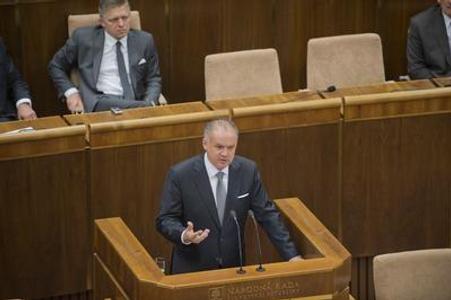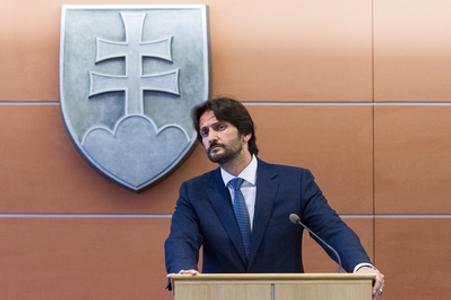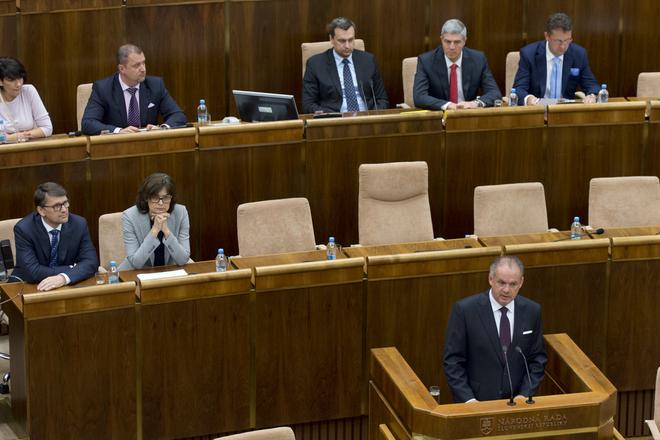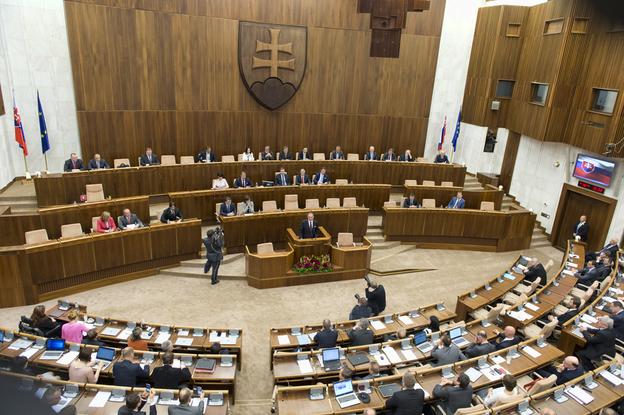This year’s parliamentary elections have revealed many risks, with one of them being the continuing distrust in politicians and state institutions, President Andrej Kiska said as he delivered his state of the republic speech on June 16. There are, however, also many opportunities that may be used to improve the current situation, he continued.
“No political subject, programme or idea was dominant in the parliamentary elections,” Kiska said in his speech. “Instead, the distrust in politics and politicians has deepened significantly.”
It is important for the current government not to rely on having a real political alternative, and for the current democratic opposition that it will be possible to easily exchange the cabinet if it is not successful. Up to four of five adults in Slovakia think that the state is controlled by a small group of oligarchs, the president continued.
“The trust of people in the state has fallen to new historical lows,” Kiska said in his speech, adding that if this trend continues and the trust of people in state and its institutions is not restored “it may be problematic, if not impossible, to form a government of any democratic political parties after the next elections”.
Most of the current cabinet members were present in the chamber, though Prime Minister Robert Fico was absent. Interior Minister Robert Kaliňák joined his colleagues shortly after the speech began. All MPs of the far-right People’s Party – Our Slovakia (ĽSNS) left after the president started speaking, the Sme daily reported.
Since becoming president in 2014, Kiska has spoken in parliament on several occasions. Most recently, he addressed MPs in April, shortly after the parliament adopted a new programme statement of the government. He called on people not to be hostile and stressed the need of restoring the trust of people into state politics, Sme wrote.

Corruption widely discussed
Though Kiska stressed he does not want to interfere into the coalition matters and political disputes, the president also commented on the recent corruption scandal known as the Bašternák case. It concerns the excessive VAT refunds granted to businessman Ladislav Bašternák’s firm BL-202 under dubious conditions. Moreover, the recent media reports also point to links between the businessman and Kaliňák.
Kiska said that he cannot give the parliament, the government and the political parties any advice what to do in the case which they would not already know, but stressed that if it continues this way, “it will have serious consequences”.
“There is probably no one who would believe the story that someone brought €12 million in cash in briefcases,” the president said in his speech, which was accompanied by the applause of opposition MPs.
According to some commentators, the president also indicated in his speech that Kaliňák should leave, by saying that taking political responsibility for scandals is not solution to any case, but “an ordinary gesture of decency which should calm down the public and enable the work of respective institutions”.
Commenting on work of the criminal and tax authorities, Kiska said that nobody should be surprised that people do not believe them. According to him, they expect real results and explanations of the unsolved scandals.
In this respect, the president pointed to Romania where more than 1,500 people, including top politicians, businesspeople and even doctors, have been accused, prosecuted and sentenced for corruption since the last parliamentary elections.
“The suspicions of corruption and cronyism in high politics are a topic which raises the biggest emotions and political disputes and attracts media’s attention,” Kiska said. “Unfortunately, the declared political importance of this topic is strictly at odds with what we could call the satisfying results.”
He also called on politicians to look for solutions that will give people “real hope, faith and self-confidence” that the law violations will not stay unsolved and unpunished.
The president also commented on the current coalition dispute over the licence fees for public-service broadcaster RTVS, calling on respecting the independence of public media.

Fighting extremism
The president also shortly commented on the increase in extremism and neo-Nazism in politics. He considers the current situation opportunity rather than a reason for concern. An opportunity to show “zero tolerance to the expressions of extremism and neo-Nazism on the streets, on the internet, on the sports grounds – anywhere”.
“In my opinion it means that the state will self-confidently take measures against everybody who tries to substitute its role when securing order,” the president said.
He also called on re-considering the concept of the annual celebration of the Slovak National Uprising (SNP) which he considers the “real heroic democratic chapter of our nation”. Instead of official ceremonies near the memorials, it is necessary to use non-traditional forms which will make the event attractive for all people of all generations.
“So we can send the neo-Nazism, anti-Semitism, racism, denial of the Holocaust, and relativisation of the crimes against humanity into the corner,” the president stressed, adding that also part of the Slovak nation contributed to these crimes in the past.
Presidency is an opportunity
The president also commented on upcoming presidency over the EU Council, calling it an important report on the current state of Slovakia .
“It is a success of our country, but also an honourable duty and opportunity for Slovakia,” Kiska said.
The presidency does not only give the country the strongest political and economic status it could ever achieve, but also the stability and security to the whole central European region, he said.
“Thus our membership in the EU does not have any reasonable alternative,” Kiska stressed, calling any ideas and proposals of Slovakia working better outside the EU hazardous and non-patriotic.
In this respect he referred to supporting the political forces whose aim is to break up the club. Regarding the upcoming Brexit referendum, the president said that it would be risky to let similar doubts prevail also in other countries, especially in central Europe.
“I say this also because part of our duties will be to contribute to the unity of the EU with our ability to negotiate good compromises,” Kiska said.
He expressed hope that Slovakia will not only be able to negotiate its own interests and unite on regional level, but also to become “fair, honest and sincere mediator between the countries and their interests, in favour of all”.
The president also hopes that the country will introduce itself as “friendly hosts, sensible coordinators of European discussion and avid co-creators of European unity”.
Health care and education remain priority
Kiska also returned to the theme that health care and education need reform.
“People in Slovakia are not interested in tools with which we want to achieve some goals in these days; they want to see results,” the president said.
Kiska presented some areas that may become priorities of the current government for following four years. As for health care, he stressed the need of the equal diagnoses, medical methods and medical treatment for all people in Slovakia, as well as the clarity in the system of insurance payments.
Regarding the education, he reminded of the public pledge of new Education Minister Peter Plavčan to prepare the biggest reform in past 25 years. We should specify what should be achieved and also increase the demands on education system, the president stressed.
In this respect, he also focused on problems with Roma education, recommending focusing on the problem of their poverty and low level of education.
In the end of his speech, he called on politicians to improve the current situation so people will not be proud only of athletes.
“So everybody can say: This country, our Slovakia, is not only for the best; not only for the rich; not only for the chosen ones,” Kiska added.



 (source: TASR)
(source: TASR)
 (source: TASR)
(source: TASR)